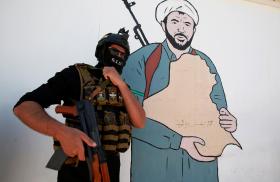
- Policy Analysis
- PolicyWatch 3597
The Baghdad-Kurdistan Energy Arena: Policy Opportunities

Washington has many good options for avoiding a Kurdish economic meltdown and turning Iraq’s internal energy dispute into a net win for all players, but it must pursue them quickly.
When Iraq’s Federal Supreme Court (FSC) ruled last month to overturn the law governing Kurdish oil and natural gas exports, it brought decades of pent-up energy disputes to a head. Years earlier, the post-Saddam constitution had loosely enshrined the existence of a semi-autonomous Kurdistan Region of Iraq (KRI) based on two fundamental facts: that Kurds in the north had been self-governing since they expelled federal regime forces in 1992, and that they needed incentives and assurances before they would cede some of this autonomy and reintegrate with Baghdad. Yet interpretation of the charter’s energy and revenue-sharing articles (110, 112, 115) proved deeply contentious, leading the KRI to press ahead with its own oil and gas law in 2007, which in turn provided the basis for numerous production-sharing contracts with international investors.
Lacking a federal hydrocarbons framework law and revenue-sharing law to sit alongside the KRI energy law, Baghdad has long refused to recognize these contracts or the region’s wider right to export oil on its own. Previously, federal efforts to seek legal recourse had mainly focused on a long, inconclusive campaign at the International Chamber of Commerce, where Baghdad sought arbitration against Turkey for facilitating these exports. With the February ruling, however, the federal government now has a binding FSC judgment in hand—one that declares the 2007 KRI energy law unconstitutional, transfers oil marketing rights to Baghdad, and requires all production-sharing contracts to be placed under federal oversight via the Ministry of Oil.
The KRI has long questioned the constitutionality of the Iraqi government’s oil policy and judiciary. Yet whatever the merits of these arguments may be, Baghdad and most international observers now consider the FSC ruling to be binding and final. Sticking one’s fingers in one’s ears—as the KRI appears ready to do by not joining negotiations with Baghdad—will only make the situation worse.
Instead, the Kurds should engage with the three committees Baghdad has formed to address different aspects of the ruling. If they go that route, a dispute resolution process can begin. If not, federal officials will feel compelled to implement the ruling as is, since otherwise they face the very real threat of being attacked by Iran-backed militias, criminally prosecuted, or removed from office. Such implementation could lead to legal injunctions against any oil traders, shippers, insurers, and extraction companies that cooperate with Kurdish authorities.
U.S. Interests at Stake
The United States and its international partners have a clear strategic interest in preventing such disruption and helping Iraq settle its energy disputes once and for all. In the near term, none of these partners wants to see around 500,000 barrels of oil per day disappear from the market in the middle of the Ukraine-Russia war, but that is precisely what would happen if Baghdad and the KRI stopped sharing the export pipeline infrastructure between northern Iraq and Turkish ports. Great damage could also be done to budding KRI gas production schemes, which are scheduled to link up with Turkish and European lines in 2023. The latter plan has become all the more urgent now that the EU faces the risk of Russia cutting off its gas supplies.
Meanwhile, two painstakingly constructed U.S. International Development Finance Corporation loans to the KRI are now in danger. Such disruption, coupled with wider legal injunctions against Kurdish oil flows and banking activities, could swiftly collapse the KRI economy, plunging five million residents and a million displaced persons into a new humanitarian crisis that is bound to trigger additional refugee flows toward Turkey and Europe. It would also complicate the International Chamber of Commerce arbitration between Iraq and Turkey.
Policy Recommendations
Given these risks, the United States and other parties need to intervene swiftly and adroitly, first by steering the FSC dispute toward constructive crisis management, and then by helping Baghdad and Erbil sustain a slow but steady resolution process through dialogue. Such urgency has not been evident in the initial U.S. response—Washington has made all the right noises in prodding officials and banks to work together, but it has not acknowledged the potential for a real meltdown. Just as the U.S. government ultimately regretted underreacting to the 2017 Kurdish referendum debacle and the Kirkuk dispute, the esoteric-seeming FSC spat carries substantial risk of unforeseen fallout. A large portion of Iraq could be plunged into deep economic crisis, and the country’s U.S.-midwifed model of federalism could be overturned in a sudden and destabilizing manner.
U.S. officials also need to recognize that the timing of this crisis was manufactured by Tehran and its militia allies. Iranian meddling is the widely accepted interpretation of why the FSC suddenly ruled on the constitutionality of Kurdish crude exports in the middle of Iraq’s delicate government formation process, after the case had been frozen for nearly a decade. Like previous crises, this moment is partly intended as a test of U.S. vitality and responsiveness. By splitting America’s Kurdish and Arab partners in Iraq, Tehran no doubt hopes to torpedo the nascent cross-sectarian majority government and enable its militia partners to essentially reverse last year’s election losses. A historic opportunity still exists for progress in Iraq, but the KRI is being punished for trying to seize it in the face of Iranian opposition.
Accordingly, the U.S. government should set the following steps in motion quickly if it has not already done so:
- Sharpen the interagency focus. As the leading edge of a broader Baghdad-KRI policy initiative, the U.S. National Security Council should convene a policy coordination meeting on the urgent issue of sustaining oil exports from northern Iraq.
- Form an international contact group of like-minded states. To coordinate the actions of transatlantic and Asian partners in guiding Baghdad-KRI talks toward a win-win solution, the U.S. missions in Baghdad and Erbil should either create a working group or plug into existing Erbil-based diplomatic and economic working groups.
- Reassure the Kurds about participating. KRI officials fear that openly engaging with Baghdad on FSC-related issues will strengthen the February ruling and undermine their longstanding constitutional arguments. Washington and the aforementioned international contact group should therefore strongly reassure the Kurds that if they engage with Baghdad soon, foreign attention and mediation will be provided throughout the process. The downsides of stonewalling the FSC (e.g., triggering injunctions against Kurdish oil exports) must be clearly spelled out, and contrasted with the upsides of gradually implementing the court’s ruling once Baghdad-KRI dialogue is underway.
- Provide technical support on sector integration. The U.S.-led contact group should help Baghdad and Erbil think more quickly and clearly about mechanisms that satisfy most of their concerns about joint marketing, federal absorption of KRI oil trader debts, and Baghdad’s management of existing KRI oil contracts. On the debt issue, U.S. or international financial institutions may be able to assist with offsetting soft loans.
- Encourage de-risking against Russia sanctions. A U.S.-led contact group could provide technical and financial support to help the KRI safeguard its oil export infrastructure, which is 60 percent owned by a Rosneft subsidiary and therefore potentially vulnerable to the recent wave of international sanctions against Russia.
- Flow emergency measures into a new grand bargain dialogue. All of the above efforts should be conducted with an eye on the longer-term goal of permanently resolving major Baghdad-KRI disputes via a federal hydrocarbons framework law, a revenue-sharing law, and additional joint security and administrative projects along their disputed internal border. The latter effort could build on recent successes such as the formation of two “joint security brigades” along that border. Helping Iraq find lasting peace with its largest ethnic minority is a transformational improvement that the United States and its partners can and should help bring about.
Michael Knights is the Bernstein Fellow at The Washington Institute and cofounder of its Militia Spotlight platform.


